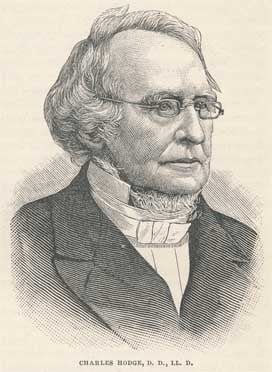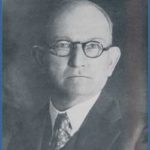Recently the magazine CHRISTIANITY TODAY has been in the news, and with some relevance we re-post an earlier article from some years back concerning the Rev. J. Marcellus Kik, one of the first editors of the magazine. In the first three years or so of that magazine’s existence, articles, reviews and letters to the editor were so frequently contributed that the magazine had a decidedly Reformed flavor to it. As Rev. Kik moved on to other efforts, those contributions were fewer and fewer in succeeding years.
Additionally, we’re also presenting some news with this post, that the PCA Historical Center has begun a project to digitize a newspaper published by Rev. Kik. His paper was titled BIBLE CHRISTIANITY, and it ran from late in 1935 until the early 1950’s. Click here for the index page, which will have links to each issue. The first three issues of the paper have already been posted, and more will follow in January and then throughout 2020. This is a side-project at the Historical Center, but one we hope to stay after.
The Quiet Influence of a Canadian Presbyterian

Quiet workers, in God’s kingdom, are often found to have an abiding influence.
“Whatever you do, do your work heartily, as for the Lord rather than for men,” – (Col. 3:23, NASB )
)
In 1965, the following obituary (slightly edited here) appeared on the pages of Christianity Today, observing the passing of one of the founding editors of that magazine:
The Reverend J. Marcellus Kik was one of the first three members of the editorial staff of Christianity Today, from its inception in 1955. When the magazine was initially planned, advice was sought from hundreds of men in this country and abroad. None of the replies showed more depth of understanding and vision for this Christian witness than Mr. Kik’s. His long experience as a pastor and as editor of a church paper in Canada enabled him to make a significant and lasting contribution to this magazine, which he served as associate editor.
About 1960, Mr. Kik assumed the post of research editor. In that capacity he spent many months in Europe, particularly in Switzerland and Holland. In Geneva he received permission to study all minutes’ of the consistory for the period of Calvin’s great ministry in that city, and also the minutes of the city council during the same years. Mr. Kik had these minutes microfilmed and then translated from seventeenth-century French into English. These indefatigable efforts brought to light the clear distinction Calvin made between his duties as a Christian citizen and the spiritual role of the corporate church in society.
During 1927 and 1928 Mr. Kik attended Princeton Theological Seminary, and he was part of the first class graduated from Westminster Theological Seminary in the Spring of 1930. For the next twenty-two years he held pastorates in Canada, where he also conducted a weekly radio program for thirteen years. He wrote a number of religious books and served on the Board of Trustees of both Westminster Seminary and Gordon College and Divinity School.
Mr. Kik continued his Calvin research up to the week of his death. In 1964, he underwent radical surgery from which he never fully recovered but which never daunted him in his work and witness for his Lord. He died in Philadelphia on October 22, in 1965.
Funeral services were held in the Second Reformed Church of Little Falls, New Jersey, of which he had been pastor for eleven years before joining the staff of Christianity Today. A testimony to his life echoed through the hymns sung at the service: “O, for a Thousand Tongues,” “Hallelujah! ‘What a Saviour!,” and “Great Is Thy Faithfulness.”
Jacob Marcellus Kik was born in Phillipsland, Netherlands on 24 December 1903. He attended Hope College, graduating in 1927 and then went on to Princeton Seminary, attending there from the Fall semester in 1927 through the Spring semester of 1929. He then transferred to the newly founded Westminster Theological Seminary in the Fall of 1929 along with other Biblical conservatives. He graduated from Westminster in May of 1930, was ordained by Miramichi Presbytery on 29 October 1930 and pastored the Bass River and West Branch churches in New Brunswick, Canada from 1930 to 1933.
Rev. Kik’s influential role began early on, as noted in this article, speaking of the situation in Canada in the 1930’s and following:
“A pattern had been established. Independent Presbyterian journals presented an opportunity for minorities to present their views and gain an audience. Only a decade after church union, a new independent journal would appear. Bible Christianity owed much to the fundamentalist-modernist controversy of the 1920s and 1930s from which Canada was largely spared. The magazine, supported by W. D. Reid, minister of the well-heeled Stanley Church, Westmount, Montreal, became known for its outspoken opposition to what it perceived as liberalism in the continuing church. Bible Christianity was edited by J. Marcellus Kik, a Presbyterian minister who was among the first graduates of Westminster Seminary after it split from Princeton in 1929. Kik had been minister in New Brunswick but came to Montreal in 1936 and served there in various capacities (for a time as full-time editor and religious broadcaster) from 1936 to 1952. [The later Bible Presbyterian, which was published out of New Glasgow, Nova Scotia, by dissident Presbyterian minister Malcolm MacKay.]” — Note: Vol. 1, no. 1 of Bible Christianity is now posted in PDF format.
Another article, on the early history of the Banner of Truth Trust, notes the influence of Rev. Kik:
“Among Professor Murray’s chief concerns was the restoration of true preaching. One who shared this view was the Rev J Marcellus Kik, a trustee of Westminster Seminary. This subject was discussed with Mr. Kik when he was present in London in 1961. As a result he carried back to Professor Murray in Philadelphia a proposal that a conference should be held for ministers the following year in the UK, concentrating specifically on the need for a renewal of preaching.” [Thus the beginnings of the annual Banner of Truth Pastors’ Conferences.]
 There is some dispute as to exactly on what date in December Charles Hodge was born. Several sources, one of them a Presbyterian one, states that he was born on December 28, 1797. Dr. David Calhoun, author of the celebrated book on Princeton Seminary, states that he was born on December 27, 1797. That is the date we will use for this historical devotional.
There is some dispute as to exactly on what date in December Charles Hodge was born. Several sources, one of them a Presbyterian one, states that he was born on December 28, 1797. Dr. David Calhoun, author of the celebrated book on Princeton Seminary, states that he was born on December 27, 1797. That is the date we will use for this historical devotional.


